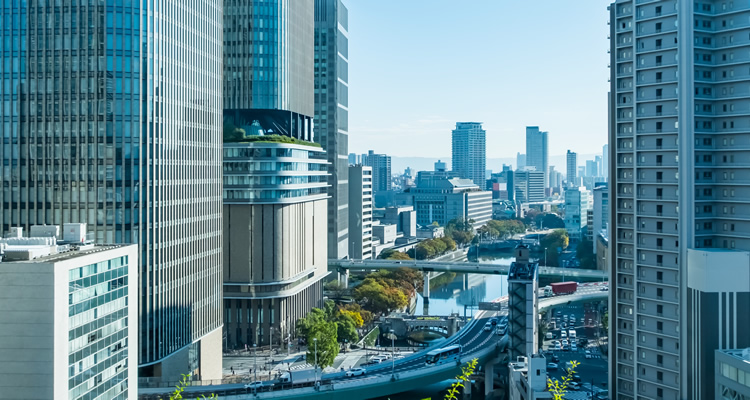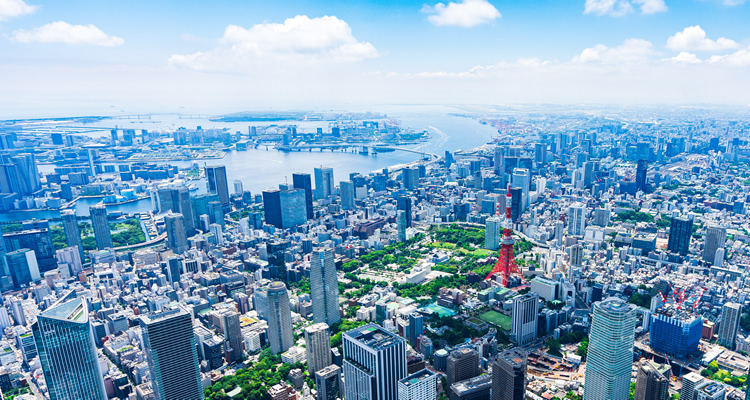
In recent years, the number of foreign investors looking to buy real estate in Japan has been on the rise again.
Considering that the a land bubble in the 1980s and the Lehman shock in the U.S. had a major impact on the real estate bubble, it is no wonder that many people feel that the real estate industry is somewhat unstable and uncertain about the future, but there is no doubt that real estate is a major pillar supporting society.
In addition, after the 2021 Tokyo Olympics, and with the new coronavirus epidemic gradually settling down, Japanese real estate values in 2022 will be on a stable trend from a global perspective, and many investors are paying attention to this trend.
Here is a detailed look at the current situation of the Japanese real estate industry and what attractions and cautions it has to offer.
■The Current State of Real Estate Investment in Japan
According to data from the Ministry of Land, Infrastructure, Transport and Tourism, which summarizes the recent real estate situation in Japan, J-REITs, which allow investors to start real estate investment with a small amount of money without becoming a real estate owner, invest mostly in office properties, while investment in condominiums is currently the most common way to become a real estate owner.
Based on this situation, here are some of the areas where there is demand.
- 1. Very high demand in the Tokyo metropolitan area
Despite the significant impact of coronavirus, the real estate locations that remain in demand are those in the Tokyo metropolitan area.
The attractive points include the continued influx of people, international events, and the prospect of urban development.
All three benefits work in concert with each other, and as the population increases, global events such as the Olympics will naturally be attracted to the area, which in turn will lead to more development to promote the city. In this way, the high value of the city can be expected to continue to grow. - 2. Offices are the most popular investment destination
One of the most popular places to invest in is an office in a city center. As a new way of life, telework and work-from-home jobs are on the rise, but not many companies think that they can do all their work without an office, so even if the space is not very large, companies think that having an office in the city center is more convenient and secure. Even with the changing times, the high demand for office space will continue to provide high asset value as an investment property.
In addition, according to a survey of overseas investors conducted by the Ministry of Land, Infrastructure, Transport and Tourism in fiscal 2019, 76.5% of overseas investors who responded to the survey said they have invested or are investing in Japan.
The following are the most popular investment properties among them.
No. 1: Offices
No. 2: Residences (condominiums, apartments, etc.)
No. 3: Logistics facilities (distribution centers, warehouses, etc.)
No. 4: Commercial facilities
No. 5: Hotels
As I mentioned above that office investment is relatively popular among Japanese investors, but the responses from overseas investors also show that office space in the Tokyo metropolitan area is extremely valuable.

■The appeal and drawbacks of Japanese real estate from an investor’s perspective
Now that we have discussed the current state of real estate investment in Japan, what are the attractions and drawbacks of actually investing in Japanese real estate?
Let’s take a look at some of the advantages and disadvantages of investing in Japanese real estate.
There are three advantages points.
- 1. Low country risk
Japan is a rare region in Asia that is rated A with the lowest country risk.
Country risk is a risk that is unique to a country due to social circumstances. For example, when a country’s system fundamentally collapses due to the collapse of a long-term dictatorship, or when there is a tendency for rapid changes in social conditions due to ethnic conflicts, the country is rated as having high country risk.
Therefore, investing in Japan has become popular among foreign investors as a low-risk investment.
However, since Japan is already a well-developed country, it is unlikely to have the same situation as developing countries where real estate values soar due to rapid development. As the risk is low, large profits cannot be expected, but it is still an attractive investment destination. - 2. Low hurdle for foreigners to purchase
In Japan, there are no specific regulations for foreigners to purchase real estate. Some countries do have restrictions on foreigners purchasing property. Singapore, for example, prohibits foreigners from buying or owning land. Australia, on the other hand, stipulates that only newly built properties or land can be purchased.
In Japan, however, there are no regulations or even additional taxes on foreign buyers. This means that Japanese and foreigners can purchase real estate under the same conditions.
In addition, the required fees are the same as those for Japanese, making the real estate investment market very easy for foreigners to enter. - 3. Cheapness
What Japanese people tend to overlook the most is the fact that Japanese real estate is undervalued in the eyes of foreigners. The recent rise in real estate prices has made them less cheap than they were a few years ago, but even so, Japan remains popular because there is less risk of not being able to recoup profits and the yields are higher than in other developed countries.
Then there are three drawbacks.
- 1. Risk due to location
The location of Japan means that the country is at risk of earthquakes. If you are not prepared for earthquakes, which are rare in other countries, you will not be able to make a successful real estate investment in Japan. Even the bay area, a popular area in the city center, actually has its own specific risks to consider, such as liquefaction caused by earthquakes.
It is also advisable to have earthquake insurance when buying real estate in Japan. Earthquake insurance incurs the cost of paying monthly premiums, but it is not so expensive that it will significantly alter your yield. No matter how sturdy your real estate is, if a fire breaks out as a result of an earthquake, the damage will be great. Taking out insurance is an important part of investing in case of a disaster. - 2. Japan’s declining population and aging society with low fertility
In the city center, the number of people coming from other prefectures is high and the population is on the rise, so it is unlikely that the need for properties in the city center will suddenly decrease, but the demand for real estate will change in no small way.
In terms of changes in real estate demand, we need to keep in mind the declining birthrate and aging population. As the birthrate declines and the aging of society accelerates, the number of elderly people living alone is expected to increase. Therefore, rather than family-type apartments, properties for elderly people living alone or small studio apartments may maintain high demand in the long term. - 3. Exchange rate risk
As is always the case with international investments, we must also take into account the risks associated with currency exchange rates. In Japan, the Bank of Japan’s aggressive monetary policy has weakened the yen in recent years, resulting in a difference of more than 20 yen per dollar compared to the strong yen policy before the change of government.
Japan’s efforts to weaken the yen have been criticized by the U.S. as well, and we do not know how long Japan will be able to maintain that policy. As long as you own real estate in Japan, your profits will be denominated in yen. When you convert it into Renminbi or dollars, the exchange rate becomes involved. Rather than thinking of your investment plan in terms of the current exchange rate, you need to design a flexible investment plan based on the assumption of how much exchange rate fluctuation you can handle.

■ Real Estate Investment in Japan Points to Note
After foreign investors purchase a property in Japan, it is recommended that they find a property management company.
By using a property management company, you may have to pay a management fee, but the company will provide services such as recruiting tenants, handling problems, and rebuilding the property if the rent is overdue.
Here are some points to keep in mind when hiring a property management company to manage your property.
The following are four points to keep in mind.
- 1. Confirm where to send the rent.
In general, rent is transferred in the following manner: tenant (rent) ⇒ management company (rent – management fee) ⇒ owner’s account.
Since foreign investors cannot have an account at a Japanese bank, it is possible to remit the rent to an overseas bank on a designated every month, but the fee is expensive.
Therefore, it is better to transfer a certain amount of money in a lump sum and have the management company hold the rent for you. - 2. Ask for regular reports on the management status.
Although it may vary slightly from one management company to another, you should ask for regular reports on the management status of the property.
It is important to keep up to date with information about the property, such as whether there have been any problems with tenants or if the property’s facilities have been broken. - 3. Get registered as a tax agent.
Since foreign investors are not in Japan, it is necessary to register with a property management company as a “tax manager” and have them handle the tax payment procedures on your behalf.
In general, taxes are paid from the rent deposited, so it is important to keep track of your deposits and withdrawals by getting a copy of the tax payment notice. - 4. Request a tax return to be filed on your behalf.
In Japan, rental income from real estate investment must be reported as real estate income on your tax return.
Some property management companies have their own tax accountants, in which case you can ask them to file on your behalf.
If not, ask the company to introduce you to a tax accountant.
The fee for a tax accountant is said to be around 50,000 yen per property per tax return procedure.

■Conclusion
So far, we have seen how much real estate is worth in Japan. Currently, the trend of investment real estate in Japan is stable and is still recognized as valuable worldwide.
However, there are still some issues that need to be addressed, such as the impact of the declining birthrate and aging population, and the need to incorporate the latest technology.
The secret to success is to make a solid investment plan while taking risks into consideration.
